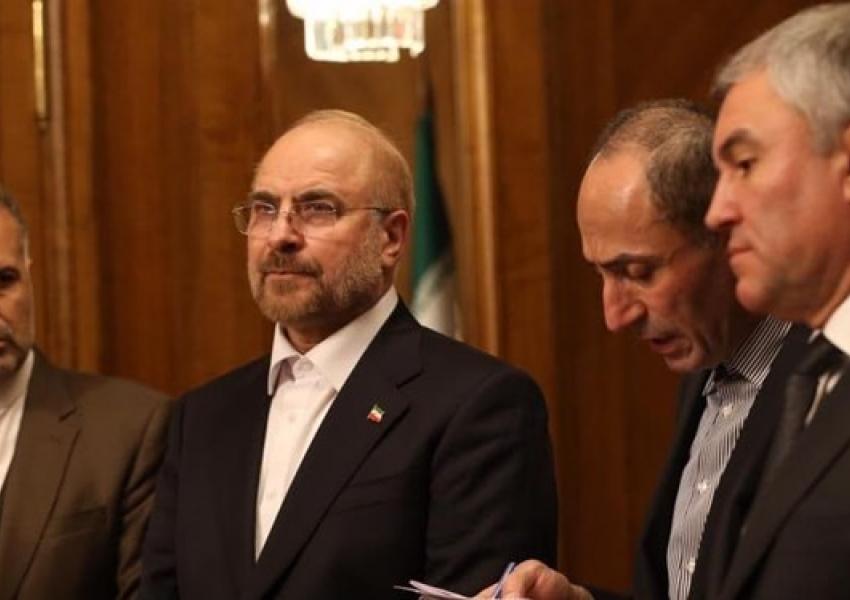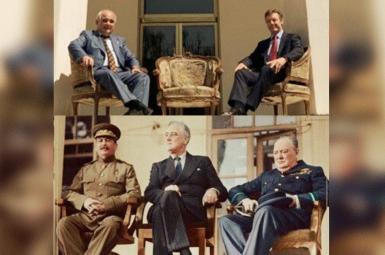
Week-Long Rumpus Over Majles Speaker’s Role As Moscow Courier
A spokesman for the presidium of the Iranian parliament (Majles) says a recent message from Iran’s Supreme Leader Ali Khamenei to President Vladimir Putin was meant to reassure Russia that Tehran’s relations with Moscow would remain intact.
Last week, Putin declined to receive Iran’s parliamentary speaker Mohammad Bagher Ghalibaf (Qalibaf) who was carrying Khamenei’s letter, which he handed instead to Russian parliamentary speaker Viaсheslav Volodin.
Putin’s refusal to meet with Ghalibaf was widely interpreted by Iranian social media pundits as a rebuff to Khamenei, and it was a blow to Ghalibaf as a likely candidate in June’s presidential election keen to cut a figure on the international stage. But Iranian hardliner media and some Iranian officials have been trying for a week to explain away Ghalibaf’s failure to hand the letter to Putin.
The official news agency IRNA reported on February 8 that Ghalibaf had told Volodin that Khamenei’s letter was intended to “reassure [Russia] that global developments will not affect Tehran-Moscow relations,” an apparent reference to possible contacts with the United States over reviving Iran’s 2015 nuclear deal with world powers, a move new US president Joe Biden cautiously supports.
Ghalibaf and allies, who hold a parliamentary majority, have long been critical of the deal – known as the JCPOA, Joint Comprehensive Plan of Action – and are wary of Iranian President Hassan Rouhani’s desire to resurrect it. The JCPOA was a high point for Rouhani before President Donald Trump abandoned it in 2018 and imposed stringent sanctions.
Hossein Amir Abdollahian, Ghalibaf’s foreign policy advisor, claimed Khamenei’s message would reassure Moscow that changes resulting from Biden’s election would not affect Iran’s strategic agreements with “regional players,” including Russia. Another Ghalibaf ally, Mohammad Hossein Farhangi, spokesman for the Majles presidium, argued the JCPOA had “undermined many arrangements with the East.”
Russia has consistently argued that both the US and Iran should respect the JCPOA, which Moscow not only signed but backed in the UN Security Council. But Farhangi argued that “this time, we are determined to show that nothing like that [negative consequences of the JCPOA] is likely to happen again under any circumstances…We are determined to stand by any agreement we make, and we are resolved to continue all agreements we take part in.”
Ghalibaf’s critics had a field day. Political analyst Abbas Abdi tweeted: “I don’t want to belittle anyone, but I want to point out that all of Ghalibaf's moves are part of his election campaign and all of them go wrong. His advisers are less knowledgeable than him.”
On February 6, prominent Qom Seminary lecturer Rahmatollah Bigdeli tweeted: “Putin refused to receive Ghalibaf and passed him to a lower-ranking official! However, Tasnim News Agency reported that it was Ghalibaf who did not accept Putin’s health protocols!”
Bigdeli recalled an incident around a decade ago when Turkish President Recep Tayyip Erdogan had “also kept former Iranian nuclear negotiator Saeed Jalili waiting outside his palace for half an hour and no one welcomed the Iranian official! And yet Iranian conservatives say they know the world’s language and that they can negotiate with the world.”
Hossein Shariatmadari, influential editor of Kayhan daily, funded by Khamenei's office, offered a muted defense of Ghalibaf. While writing that the speaker’s aides were not fully aware of protocols in international relations, he told state television that the message was “an important document” taken by Ghalibaf “because he is a prominent political figure highly trusted by the Supreme Leader.”
The message was reportedly prepared in December. While Foreign Minister Mohammad Javad Zarif visited Moscow on January 26, he did not take the message, nor did he meet with Putin.
Farhangi told reporters on February 13 that Iran’s foreign ministry should be blamed for Ghalibaf not meeting Putin. Some analysts have pointed out it was always unlikely that Putin would receive Ghalibaf, given he would not want to be seen as favoring a likely presidential candidate four months ahead of an election.
Iranian journalist, Hossein Dehbashi tweeted: “No one has ever humiliated a representative from Iran the way this Russian…has belittled the Majles Speaker.”








